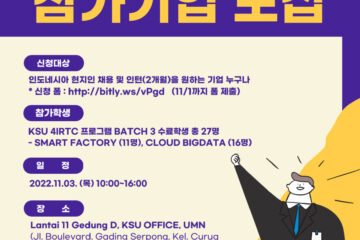Data Science is a science that is on the rise in 2021. Technological developments that continue to be increasingly sophisticated have made Data Science activists much sought after by companies. Not only for processing data, this knowledge can also provide a good basis for creating business strategies that are in accordance with the conditions in the field.
Data Science is a source of knowledge from the development of the Industrial Revolution 4.0 era. A data scientist has a big hand in enhancing existing innovations, but there are still many people who have not entered the profession that is considered excellent for most companies. The rise of companies using the concept of industry 4.0 by utilizing Big Data and Data Science to perform data analysis or predict future business developments.
To learn Data Science you are not required to take a formal education, you can start self-taught but of course you need a high learning spirit and also never give up to understand Data Science. Data Science is also closely related to mathematics and statistics is needed to practice your logic and also your analysis in a data.
1. Improve the Quality of Handling Dirty Data
Poor data quality is one of the main challenges in data science. Bad data costs organizations more than $15 Million per year. You need clean, structured data to generate big, useful, and surprising insights. Want to use deep learning techniques? Then, you will need more data and it should be neatly labeled.
You have to pick up the skills to find the data your business problem needs. Learn how to curate and transform data for analysis. Yes, data cleaning is the job of a data scientist. Play data and get your hands dirty. You will develop an eye to spot anomalies and patterns will start jumping towards you.
Let’s say the intent of your project is to analyze customer experience. The first task is to search for all potential data assets such as customer profiles, transactions, surveys, social activities. Any of these that do not map out your business problem should be discarded. Check and clear data and you will lose even more. Do this for weeks or months, and then you are ready for your analysis!
2. Don’t Stick With Tools
The data science industry is filled with hundreds of tools. No single tool covers the entire workflow. Every week, brilliant new tools are created. And a dozen went out of business or bought. Companies spend millions on corporate licenses, only to find that they are no longer attractive.
This fragmented ecosystem poses a huge challenge to the aspirants. The top question I get asked often is, “Should I learn Python or R? PowerBI or D3?” I’ve always said that the tool really doesn’t matter. Learn the technique like the back of your hand. You can always transfer your learning from one tool to another within a few weeks.
For example, to master visualization, don’t start with tools. Learn information design principles, visual design fundamentals, and color theory. Then get some real data and internalize the technique by solving the problem. Any visualization tool you can get your hands on will do the trick. Don’t over-optimize.
3. Learn From Experience in the Field
More than 80% of data science projects fail. Wondering why? There are challenges throughout the life cycle: from choosing the wrong business problem to framing the wrong solution approach. From choosing the wrong technique to failing to translate it to the user. Every role in data science contributes to this error. No, most of these loopholes are not technical in nature.
In KBBI practice is the actual implementation of what is called in theory. In formal education you will be taught by practitioners who have been deep in their work for a long time, and of course they will teach more from a practitioner’s point of view than theory. If you want to take the self-taught path in learning Data Science, of course having fellow practitioners can help you apply the theories you have learned. That way you also get a practitioner’s point of view and don’t get hung up on a theoretical point of view.
Practice is an effort to give yourself the opportunity to directly experience work. That way you will use the theories that you have learned so that the theories that have been studied will not be lost with time. This practice can be in the form of internships in companies or working on problems related to problems in the field. That way you will not be surprised by what you face if you have been working in the field directly.
Also read: Self-taught Data Science Learning? Here are the steps!
What are you waiting for? Join DQLab and Develop Your Skills in Data Science!
After all the explanations above, are you still sure that you are not learning together with DQLab? DQLab also provides materials that are offered completely and according to industry needs, compiled by competent mentors in their fields from unicorn and startup companies. So, don’t worry, you can start an online data science course with DQLab!
DQLab is committed to being a place where everyone can learn Data Science together online and also provides relevant and applicable learning modules so that they can be applied in the world of work. To date, DQLab has more than 95,000 users.
Sign up now at DQLab or click the button below to enjoy a fun and exciting learning experience!
By Yohanes Ricky Wijaya & Annissa Widya Davita




0 Comments